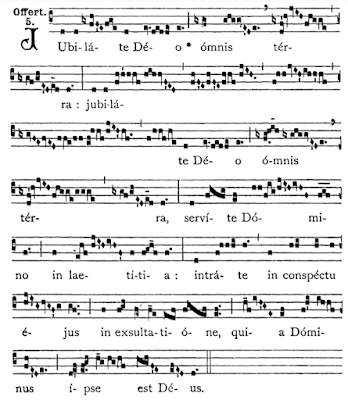The great liturgical scholar William Durandus (1230 ca. - 1296) commenting on the Mass of the Sunday after Epiphany; this Mass now yields to the feast of the Holy Family, and under the traditional rubrics, would be celebrated tomorrow. (Rationale Divinorum Officiorum, 6, 19)
The introit “On a lofty throne, I saw a man sitting, whom the multitude of angels adoreth,” is taken from (Isaiah 6, 1) “I saw the Lord sitting upon a throne”, … and the “multitude of angels” spoken of here is that which is mentioned in Isaiah, “the Angels sang ‘Holy, Holy Holy.’ ” And indeed, the lofty throne is the Church, in which God sits, and instructs us to adore Christ as the true king. …
Introitus In excelso throno vidi sedére virum, quem adórat multitúdo Angelórum, psallentes in unum: Ecce, cujus imperii nomen est in aeternum. Ps 99 Jubiláte Deo, omnis terra: servíte Dómino in laetitia. Gloria Patri... In excelso throno...And it can be said that in order for us to become a throne on which the Lord may sit, three things are necessary: purity of the flesh, humility of the mind, and exultation in the Lord. We are invited to the purity of the flesh in the Epistle (Romans 12, 1-6), which says “Brethren, I beseech you (by the mercy of God, that you present your bodies a living sacrifice, holy, pleasing unto God) etc. We are invited to humility of the mind in the Gospel by the example of Christ, of whom it is said therein that He was subject to His parents. We are invited to exultation in the Lord by the Gradual, in which we bless the Lord, who alone hath done wondrous things, and in the Alleluja and in the Offertory, in which we are ordered to rejoice unto the Lord.
Graduale Benedictus Dóminus, Deus Israël, qui facit mirabilia magna solus a sáeculo. V. Suscipiant montes pacem pópulo tuo, et colles justítiam.


